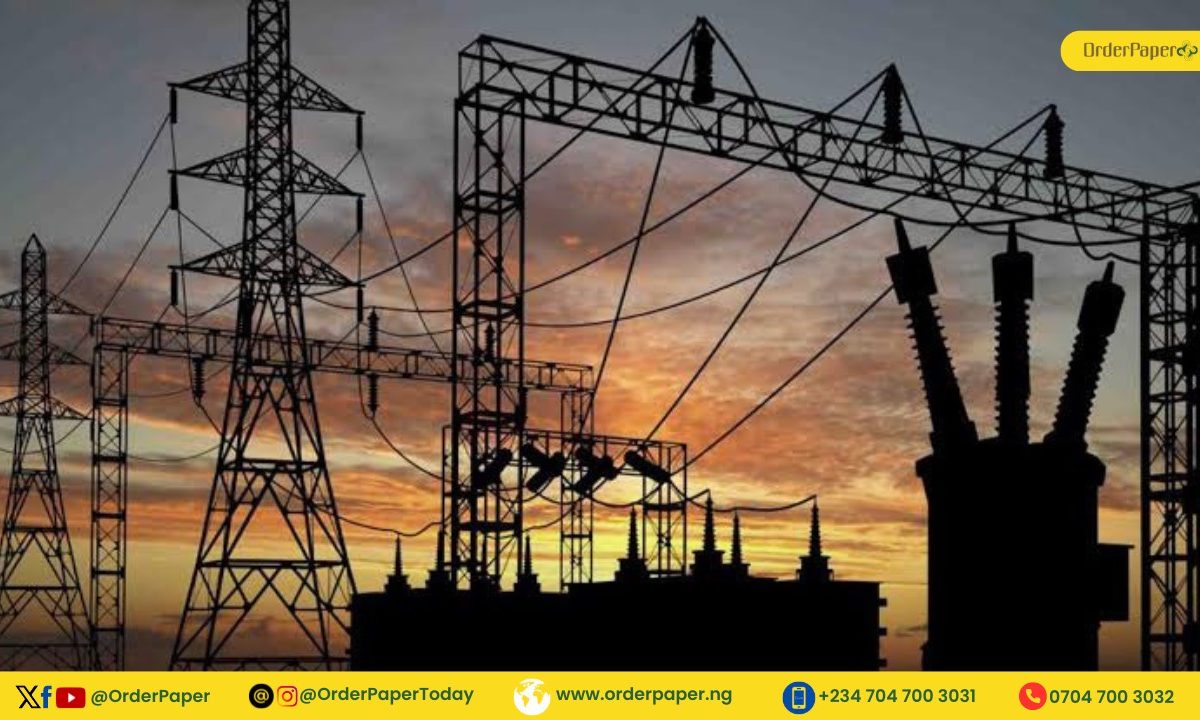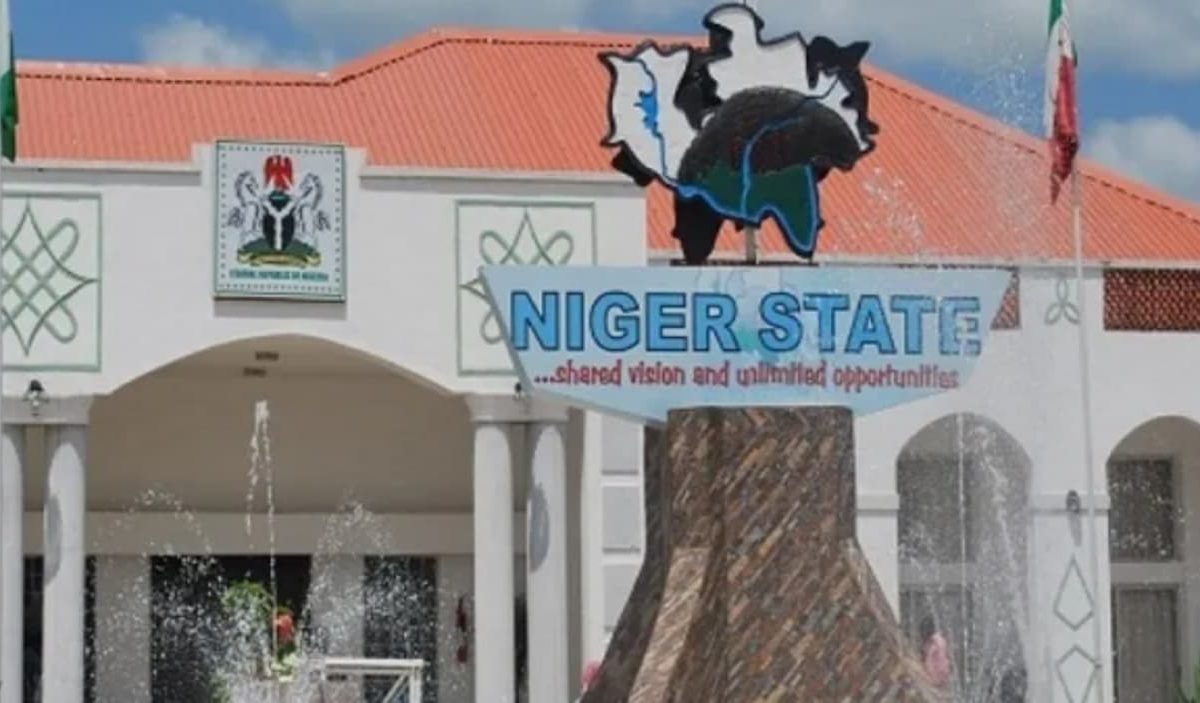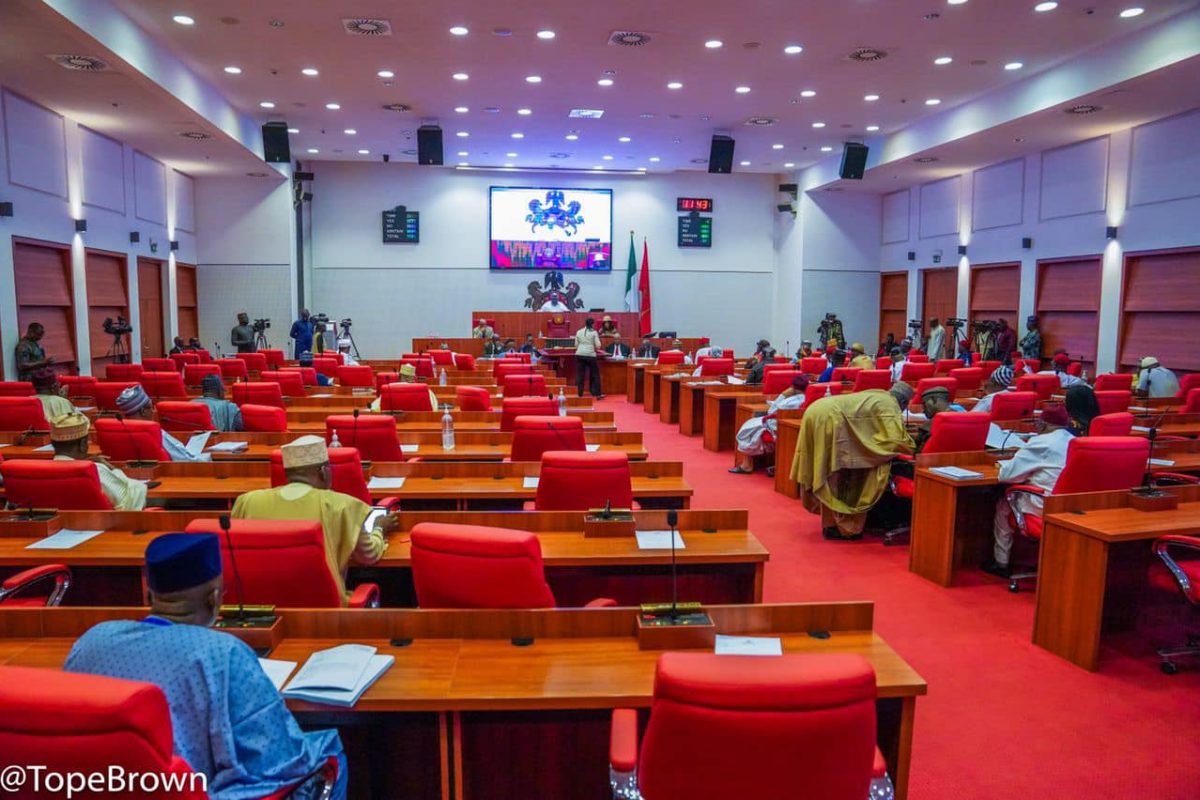As the race for the next leadership of the 10th National Assembly gathers steam, it would be interesting to see how the governing party handles the ‘ghost of 2011/2015’ still roaming.
This piece examines the background to the 2011 and 2015 ‘coups’ against the majority party in the National Assembly, as well as a rundown of power-sharing between the Presidency and the National Assembly in the Fourth Republic (1999 – 2023)
READ ALSO: 24 years after, women’s representation at National Assembly stands at 3.62%
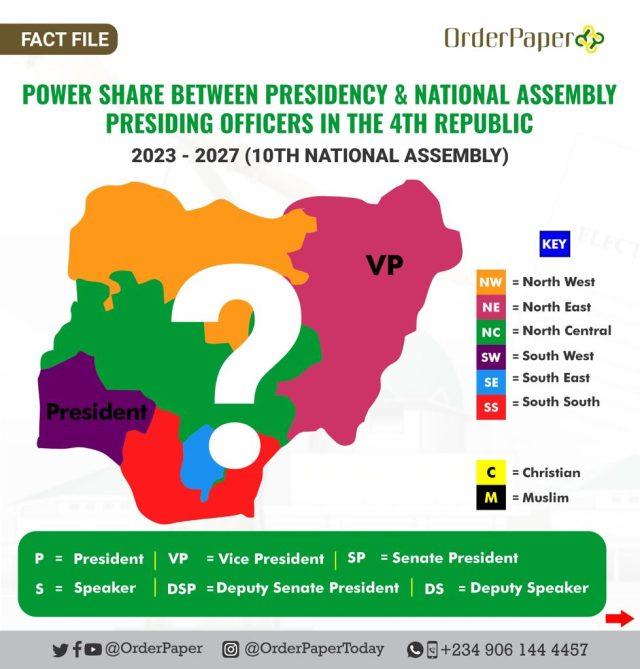
Following the February 25 Presidential and National Assembly Elections, the Independent National Electoral Commission (INEC) has declared winners for over 423 out of the constitutionally allowed 469 seats.
While controversies still linger about the processes leading to the declaration of a President-Elect and Vice President-Elect, attention is gradually beginning to shift towards the composition of the next National Assembly and political calculations that would usher in a new leadership at the federal parliament.
The build-up to the emergence of Presiding and Principal Officers for both chambers of the National Assembly is usually characterised by dozens of meetings at various levels, consultations, lobbying and horse-trading, as well as another round of campaign by those with such ambition. Importantly, however, the issue of power distribution along regional and religious demographics is at the centre of the power play that ends with the election of these key actors on the morning of the new National Assembly inauguration.
READ ALSO: “Only 33% of Nigerians voted NASS candidates on individual merit” – OrderPaper
Since Nigeria transitioned to democracy in 1999, we’ve witnessed power-sharing (zoning) among different geo-political zones and major religions as prescribed by the governing parties to foster national integration. As soon as elections are completely done with, the party with majority seats in parliament which has most often also been the governing party at the federal executive announces a power-sharing formula commonly known as the ‘zoning formula.’
Notwithstanding, this formula is, without prejudice to the preference of the President or President-Elect (as the case may be) and the party in power among the contenders for the seat. However, on two consecutive occasions (2011 and 2015), the Peoples’ Democratic Party (PDP) and the All Progressives Congress (APC), as governing parties, have had their own members in the National Assembly torpedo the agreed power-sharing formulas.
While supporters of the majority party criticised the development as treachery and disloyalty, others hailed it as an assertion of the doctrine of separation of powers, as well as the independence of the legislature as an equally important arm of government. Following these antecedents, the APC, in 2019, moved early to forestall a coup against its power-sharing agreement in both chambers of the federal parliament. Thankfully, it succeeded.
READ ALSO: How Lawan won the legal battle to contest the 2023 NASS election
The ensuing actions of the leadership that emerged from these two scenarios, as well as the operations of the federal parliament in the period under review, thus provoked arguments about what should be the true disposition of the legislature to the executive in an emerging democracy like Nigeria’s. Some have literally argued for a ‘rubber-stamp parliament’ as the outgoing Ninth Assembly is perceived, while others have thrown their weight behind what I refer to as ‘an ultra-independent parliament.’ The jury is still out on what is most acceptable.
And so, while the race for the next leadership is about to gather steam, it would be interesting to see how the governing party handles the ‘ghost of 2011/2015’ still roaming. This is in light of the fact that the APC does not command a majority in the 10th House of Representatives based on the results announced so far.
The import of this is that the APC is not likely to succeed in producing the leadership of the Green Chamber if the opposition parties leverage their numerical strength to outwit the governing party. As the key actors, in anticipation of the ‘zoning formula’ to be announced by the governing party, begin consultations on their ambition to lead either chamber of the National Assembly, here’s a run-down of the power-sharing arrangement between the Presidency and the National Assembly since 1999:
1999 – 2003 (4TH NATIONAL ASSEMBLY)
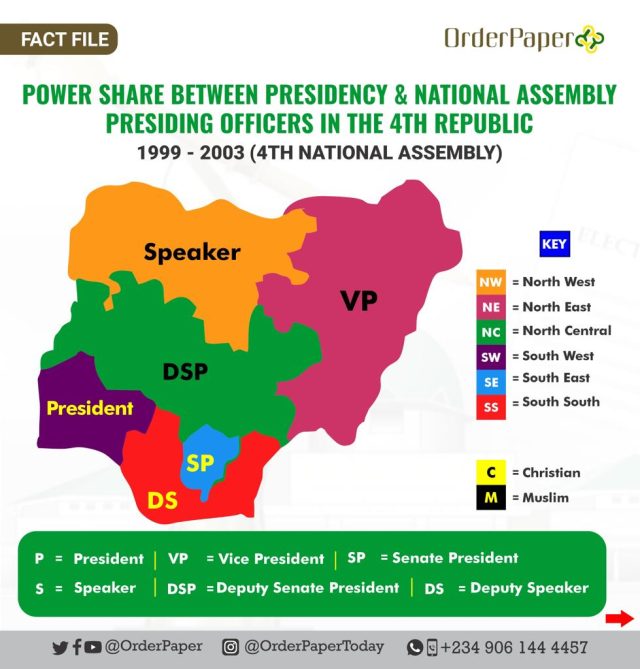
| OFFICE | GEO-POLITICAL ZONE | RELIGION |
| President | South West | Christian |
| Vice President | North East | Muslim |
| Senate President | South East | Christian |
| Deputy Senate President | North Central | Muslim |
| Speaker, House of Reps | North West | Muslim |
| Deputy Speaker, House of Reps | South South | Christian |
READ ALSO: 10th National Assembly: Former Reps, Senators making a huge comeback (1)
2003 – 2007 (5TH NATIONAL ASSEMBLY)
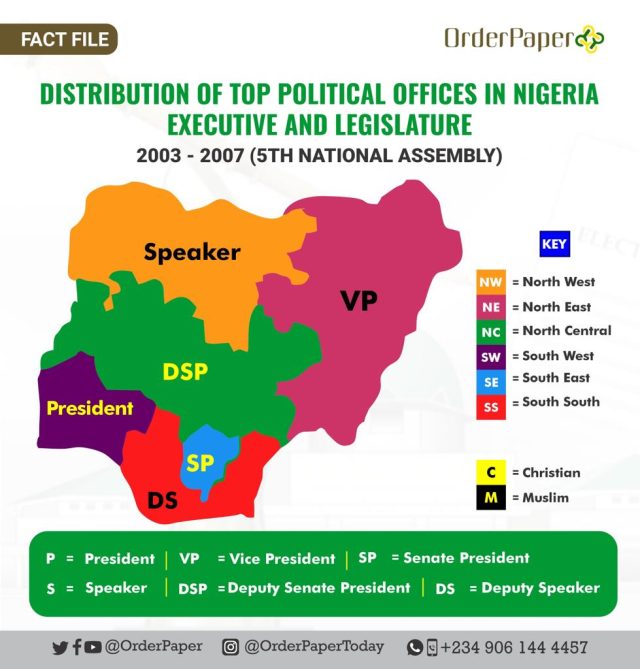
| OFFICE | GEO-POLITICAL ZONE | RELIGION |
| President | South West | Christian |
| Vice President | North East | Muslim |
| Senate President | South East | Christian |
| Deputy Senate President | North Central | Muslim |
| Speaker, House of Reps | North West | Muslim |
| Deputy Speaker, House of Reps | South South | Christian |
READ ALSO: IWD: Meet the three female Senators-Elect in the 10th National Assembly
2007 – 2011 (6TH NATIONAL ASSEMBLY)
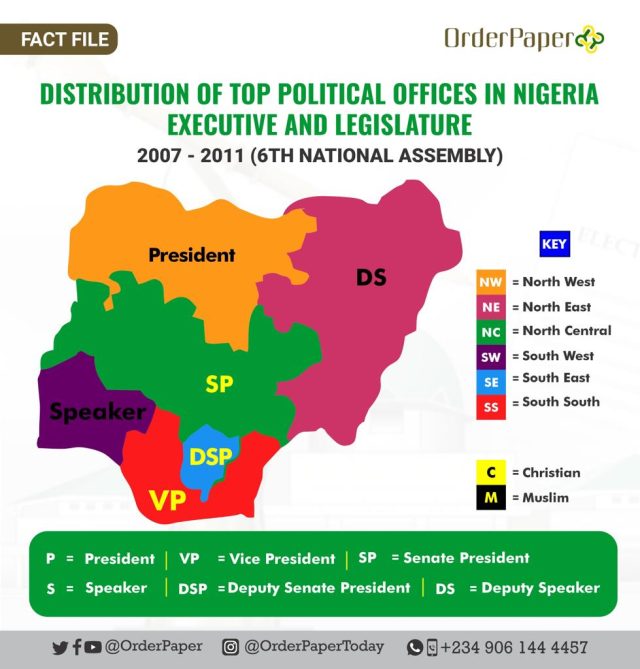
| OFFICE | GEO-POLITICAL ZONE | RELIGION |
| President | North West | Muslim |
| Vice President | South South | Christian |
| President | South South | Christian |
| Vice President | North West | Muslim |
| Senate President | North Central | Christian |
| Deputy Senate President | South East | Christian |
| Speaker, House of Reps | South West | Muslim |
| Deputy Speaker, House of Reps | North East | Muslim |
READ ALSO: PROFILES: What you need to know about Nigeria’s 14 Female Members-Elect
2011 – 2015 (7TH NATIONAL ASSEMBLY)
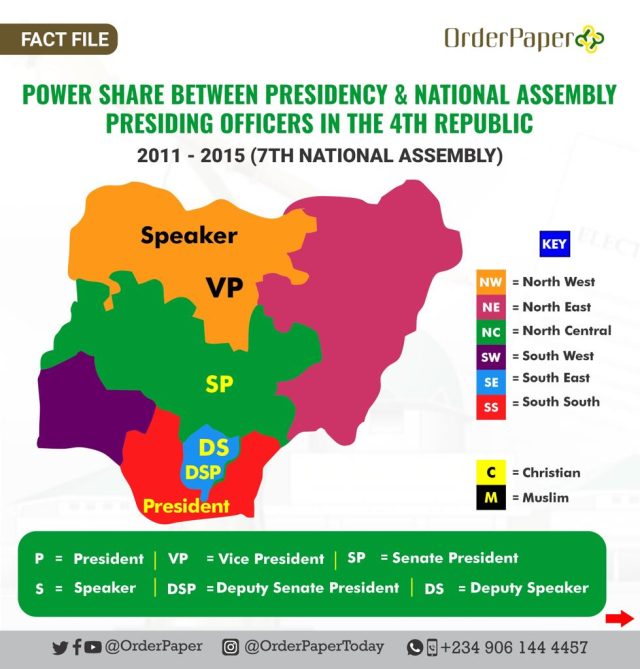
| OFFICE | GEO-POLITICAL ZONE | RELIGION |
| President | South South | Christian |
| Vice President | North West | Muslim |
| Senate President | North Central | Christian |
| Deputy Senate President | South East | Christian |
| Speaker, House of Reps | North West | Muslim |
| Deputy Speaker, House of Reps | South East | Christian |
READ ALSO: 2023: Four Rep Members on Stagnated Bills Scorecard scale through
2015 – 2019 (8TH NATIONAL ASSEMBLY)
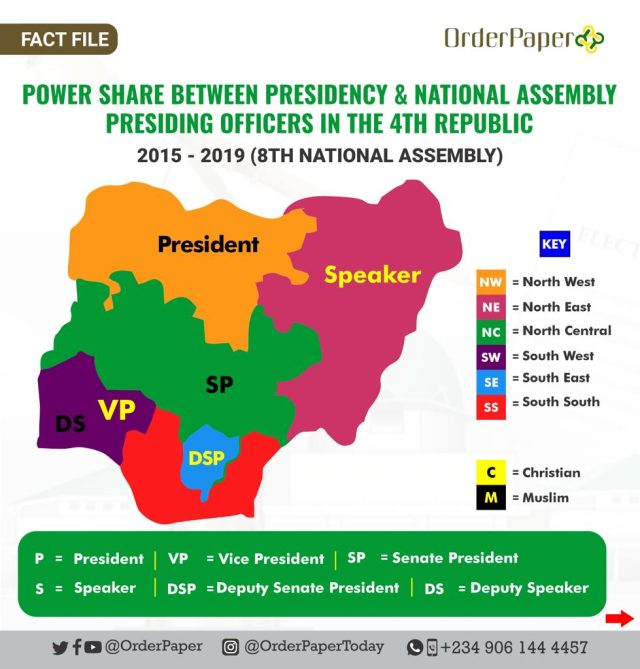
| OFFICE | GEO-POLITICAL ZONE | RELIGION |
| President | North West | Muslim |
| Vice President | South West | Christian |
| Senate President | North Central | Muslim |
| Deputy Senate President | South East | Christian |
| Speaker, House of Reps | North East | Christian |
| Deputy Speaker, House of Reps | South West | Muslim |
2019 – 2023 (9TH NATIONAL ASSEMBLY)
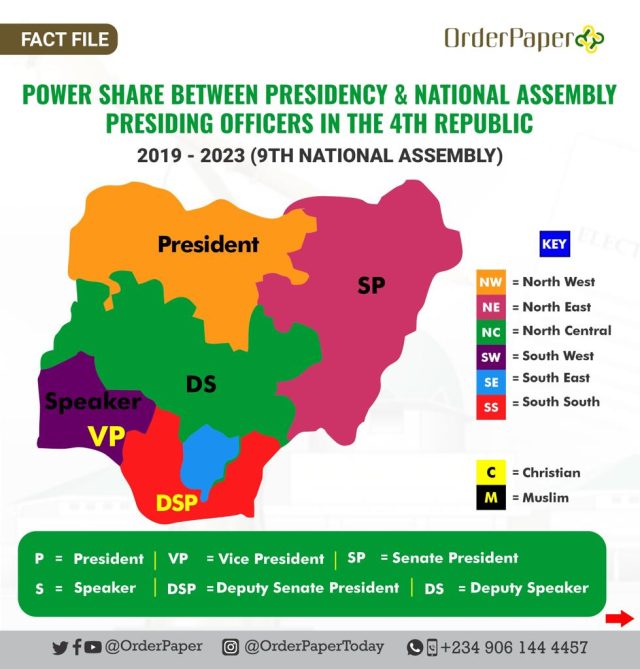
| OFFICE | GEO-POLITICAL ZONE | RELIGION |
| President | North West | Muslim |
| Vice President | South West | Christian |
| Senate President | North East | Muslim |
| Deputy Senate President | South South | Christian |
| Speaker, House of Reps | South West | Muslim |
| Deputy Speaker, House of Reps | North Central | Muslim |
FACT FILE
Since the beginning of the Fourth Republic:
- Power sharing among geo-political zones is a convention adopted by political parties to address Nigeria’s regional and religious diversities.
- The power-sharing formula also cascades to the allocation of Principal Officers after the election of Presiding Officers in the National Assembly.
- Both the PDP and APC, as ruling parties, have had their own members in the National Assembly torpedo power-sharing formulas in 2011 and 2015, respectively.
- The 6th House of Reps was initially led by Patricia Etteh (South West, Christian) and Babaginda Nguroje (North East, Muslim) before they both resigned.
- Etteh and Nguroje were thereafter replaced by Dimeji Bankole (South West, Muslim) and Usman Bayero Nafada (North East, Muslim)
READ ALSO: IWD: Why no incumbent female Senator will return to the National Assembly
- The South-South is the only zone that has never produced a President of the Senate.
- The South-South and North Central are the only zones that have never produced a House of Representatives Speaker.
- The South East and North Central zones have produced the most Senate Presidents and Deputy Senate Presidents.
- The North West zone has produced the most Speakers of the House of Representatives.
- The South East and North Central zones have never produced a President and Vice President

